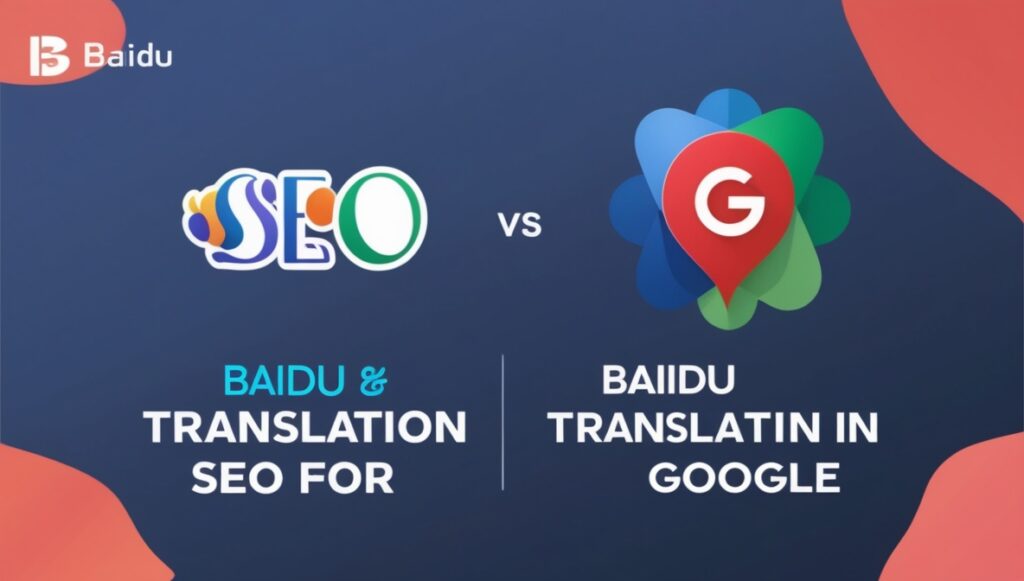
As global businesses increasingly look to expand into China’s lucrative digital landscape, understanding how to optimize for Baidu SEO is more crucial than ever. While Google dominates most of the Western world, Baidu is the king of search engines in China, controlling over 70% of the market share. This guide explores a common question many foreign companies ask: “Does translation help SEO on Baidu?“
For businesses seeking to target Chinese-speaking audiences, especially through Baidu, the answer is a resounding yes. However, it’s not as simple as plugging your content into a translation tool and expecting immediate results. Effective SEO on Baidu requires strategic, culturally appropriate translation practices, and a deeper understanding of Baidu’s unique ecosystem.
In this article, we will dive into the critical aspects of how translation impacts SEO on Baidu, best practices for optimizing your website, and why language localization—particularly to Simplified Chinese—is paramount for success.
Why Baidu SEO Differs from Google SEO

Before we explore the role of translation in SEO for Baidu, it’s important to grasp the fundamental differences between Baidu and Google. Though both are search engines, they operate under distinct algorithms, preferences, and user expectations.
- Baidu Favors Chinese Content: While Google crawls websites worldwide in multiple languages, Baidu prioritizes websites with Chinese content, specifically Simplified Chinese, which is the dominant writing system in mainland China.
- Baidu’s Censorship & Regulations: Baidu operates under strict Chinese government regulations. Certain topics are restricted, and the content must comply with Chinese laws, which can impact SEO strategies.
- User Behavior: Baidu users search and interact differently than Google users. Chinese consumers tend to favor local results, trust authority websites more, and engage with multimedia-rich content. Additionally, Baidu prefers websites hosted on Chinese servers or using local domains (like .cn).
With these differences in mind, it’s clear that optimizing your content for Baidu requires a unique approach, one that hinges heavily on accurate, culturally appropriate translations.
Does Translation Help SEO on Baidu?
The short answer is yes—but not just any translation. Effective translation is vital for SEO success on Baidu, and there are several reasons why this is the case:
1. Language Preferences
As mentioned earlier, Baidu predominantly favors content in Simplified Chinese. According to various studies, Chinese users strongly prefer interacting with websites written in their native language and script. Using English or even Traditional Chinese on Baidu will not yield the same SEO benefits.
“Using Simplified Chinese characters is essential for Baidu SEO. Simplified Chinese is the official writing system in mainland China, and most Chinese Internet users prefer it to traditional Chinese characters. Make sure all your content is accurately translated into Simplified Chinese.”
Baidu’s algorithm rewards websites that cater to this preference, as it enhances user experience by providing search results that are linguistically and culturally relevant.
2. User Intent & Localized Keywords
Translation alone is not enough; you also need to localize your keywords. This means going beyond word-for-word translations and identifying how your target audience in China searches for similar products or services.
For instance, while an English speaker might search for “best online marketing agency,” a Chinese user might search for “最佳网络营销公司.” Even though both terms mean the same thing, the keywords used and search intent can vary. To rank well on Baidu, it’s critical to invest in keyword research specific to the Chinese market.
3. Meta Tags and URLs
On Baidu, metadata—like titles, meta descriptions, and even URL structure—plays a significant role in SEO rankings. Your metadata needs to be fully translated into Simplified Chinese to ensure that Baidu properly indexes and ranks your pages.
Make sure to translate and localize:
- Title tags
- Meta descriptions
- URL slugs
For example, instead of having URLs structured in English (e.g., “/best-marketing-tips”), make sure to translate them into Chinese (e.g., “/最佳营销技巧”).
4. Localization and Cultural Sensitivity
Beyond pure translation, localization is about adapting your content to fit the cultural nuances of the Chinese market. This includes everything from the tone and style of your writing to the visuals you use on your website.
Baidu values websites that provide an engaging, culturally relevant experience. If your content reads awkwardly due to poor translation, or if it doesn’t resonate with Chinese values and preferences, your SEO efforts will fall flat.
Takeaway: Translation helps SEO on Baidu, but it must be precise and culturally informed. Content written in Simplified Chinese, with localized keywords and metadata, offers the best chance of ranking high in Baidu search results.
Best Practices for Optimizing Baidu SEO through Translation
Now that we’ve established why translation is crucial for Baidu SEO, let’s dive into specific strategies you can employ to ensure that your translated content performs well.
1. Prioritize Accurate Human Translation
Avoid machine translation services like Google Translate when creating content for Baidu. While these tools are improving, they still make mistakes that could harm your credibility and ranking.
Instead, work with professional translators who understand both the language and the culture. Ideally, the translation process should involve native speakers who specialize in SEO and digital marketing in China.
2. Focus on Simplified Chinese
As emphasized throughout this article, Simplified Chinese is non-negotiable. Websites that fail to translate their content into Simplified Chinese will struggle to rank on Baidu.
Ensure that all aspects of your site—blog posts, product descriptions, landing pages, meta tags, URLs, and even alt text for images—are fully translated into Simplified Chinese.
3. Conduct Thorough Keyword Research
Keyword research is an integral part of any SEO strategy, but when it comes to Baidu, localization is key. Just as SEO professionals in the U.S. spend time researching Google keywords, you should conduct similar research for Baidu, focusing on:
- High-traffic Simplified Chinese keywords relevant to your industry.
- Local slang or search phrases unique to Chinese users.
- The competition on Baidu for specific terms.
Tools like Baidu Keyword Planner can help you determine the most relevant search terms for your industry.
4. Optimize for Baidu’s Technical Requirements
Baidu has specific technical requirements that differ from Google, such as:
- Hosting: Baidu prefers websites hosted in China, as these sites load faster for local users. Consider using a Chinese hosting provider or a Content Delivery Network (CDN) that provides fast load times in mainland China.
- Domain: Use a .cn domain or, at the very least, a .com domain that is tailored to the Chinese market.
- Mobile Optimization: Baidu places a heavy emphasis on mobile-friendly websites. With over 90% of Chinese users accessing the internet via smartphones, ensure that your translated website is responsive and optimized for mobile.
- Multimedia Content: Baidu favors multimedia-rich content, such as videos, images, and infographics. Translate and localize the captions, alt text, and file names of these elements into Simplified Chinese.
Final Thoughts

So, does translation help SEO on Baidu? Absolutely. However, it’s not just about translation—it’s about accurate, culturally nuanced localization that caters to Chinese users’ preferences. Whether you’re expanding your brand’s digital presence in China or just getting started with Baidu SEO, translating your content into Simplified Chinese is essential for success.
Remember: translation alone won’t be enough to get your website to the top of Baidu’s search results. You’ll also need to optimize your metadata, URLs, and multimedia for Simplified Chinese, conduct localized keyword research, and ensure your site is compliant with Baidu’s technical guidelines.
For USA-based businesses looking to break into the Chinese market, offering a localized and well-translated experience is crucial to unlocking the full potential of Baidu SEO.
By following these steps, you’ll be well on your way to creating a strong digital presence in China, tapping into a market that holds immense potential for growth.
If you’re ready to optimize your business for Baidu SEO and reach millions of Chinese-speaking users, Dust Digital Marketing Ltd. offers expert services to help you navigate the complexities of Baidu’s ecosystem. We specialize in delivering seamless translations and localized SEO strategies that drive traffic and boost visibility in China’s competitive online space.

